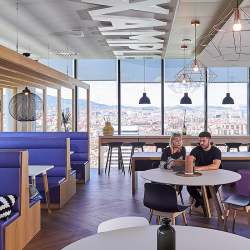June 26, 2018
UK employers aim to accelerate digital innovation, despite some cultural resistance
 The way to measure an employer’s speed of innovation includes how they find talent, their appraisal process, how employees recommend the organisation they work for to others, and how much employees collaborate, claims a new European study by Cornerstone OnDemand and IDC. “Future Culture: Building a Culture of Innovation in the Age of Digital Transformation” explores the relationship between European organisations’ speed of innovation and talent management, with the research showing that firms with a steady stream of new products and services are more likely to have an ongoing feedback process with employees, rather than an annual performance review, while organisations with a slower rate of innovation often use coaching and mentoring to develop employees.
The way to measure an employer’s speed of innovation includes how they find talent, their appraisal process, how employees recommend the organisation they work for to others, and how much employees collaborate, claims a new European study by Cornerstone OnDemand and IDC. “Future Culture: Building a Culture of Innovation in the Age of Digital Transformation” explores the relationship between European organisations’ speed of innovation and talent management, with the research showing that firms with a steady stream of new products and services are more likely to have an ongoing feedback process with employees, rather than an annual performance review, while organisations with a slower rate of innovation often use coaching and mentoring to develop employees.







 The digital era, ageing populations, skills shortages, and unpredictable political and economic contexts are persuading multinationals to focus more on mobile talent, new ways of working and assessing the cost of expatriate packages for international employees that are critical to the future of work. This is according to Mercer’s 24th annual Cost of Living Survey which reveals that factors such as instability of housing markets and fluctuating inflation, currencies and prices for goods and services, are impacting the cost of doing business in various cities around the world. UK cities have significantly risen in the ranking this year.
The digital era, ageing populations, skills shortages, and unpredictable political and economic contexts are persuading multinationals to focus more on mobile talent, new ways of working and assessing the cost of expatriate packages for international employees that are critical to the future of work. This is according to Mercer’s 24th annual Cost of Living Survey which reveals that factors such as instability of housing markets and fluctuating inflation, currencies and prices for goods and services, are impacting the cost of doing business in various cities around the world. UK cities have significantly risen in the ranking this year. 
 Almost 60 percent of UK employees are unable to identify key symptoms of the most common mental health conditions resulting in treatment delays for millions of workers. A new study from Bupa examined employees’ understanding of key psychological and behavioural symptoms of six of the most prevalent conditions in the UK, as well as identifying widely-held misconceptions. The research reveals that inaccurate assumptions have caused almost seven million people to delay seeking support for a mental health problem. Early diagnosis and treatment of conditions can improve recovery rates which is why medical experts at Bupa want to raise awareness of the accurate symptoms.
Almost 60 percent of UK employees are unable to identify key symptoms of the most common mental health conditions resulting in treatment delays for millions of workers. A new study from Bupa examined employees’ understanding of key psychological and behavioural symptoms of six of the most prevalent conditions in the UK, as well as identifying widely-held misconceptions. The research reveals that inaccurate assumptions have caused almost seven million people to delay seeking support for a mental health problem. Early diagnosis and treatment of conditions can improve recovery rates which is why medical experts at Bupa want to raise awareness of the accurate symptoms. 
























June 25, 2018
Leading with purpose is the signature strength of a great leader
by Ben Renshaw • Comment, Workplace
Know your past to understand your future
Early in our relationship I asked him about his philosophy about leadership to learn why he did what he did and what he thought about the value of his role. It was a short conversation. David’s response was that he wasn’t a leader, he was a technocrat (although he was already accountable for over 3,000 people), and his role was to deliver the numbers. I realized that going head on into leadership was not the answer. I suggested that we step back and explore what had shaped his career so far and to explore implications for his future. He agreed and quickly told me that his life had been uneventful and therefore it would be a short conversation. Two hours later we were still in the middle of running through David’s life experience and we had to reschedule for the next day. Three more hours and David had painted a rich picture of his lifeline and the impact on his career and leadership.
There were three key values that stood out from his story – doing the right thing, setting high standards and getting the job done. These were paramount for David, strongly influenced by his father who had been a significant role model. When we looked at his purpose David was less clear. He knew that he thrived on change and challenging the status quo. He was at his best when required to achieve stretching targets. He was passionate about showing loyalty to others, including friends and family. We explored his purpose until he arrived at an end point, ”Being a creator of opportunity”. This resonated wholeheartedly and ignited his fire.
Leading leaders
I asked David what it would be like if rather than thinking traditionally about adopting a leadership role he committed to being purpose-led? He was unsure at first because it didn’t seem tangible enough. I followed up by challenging him to define what being purpose-led would look like if he was to follow being a creator of opportunity on a daily basis? He described the following:
• seek new horizons for the company to grow;
• encourage people to develop and succeed;
• embrace problems as a way to learn and continuously improve;
• build relationships to develop better outcomes;
• stay energized to be at the top of his game;
• leave a legacy for the company, products and people to be in a better place than when he arrived.
By connecting with the evidence of being purpose-led, David tapped into his own internal drive to be the best he could be. I then asked him to consider what would happen if these six factors became the backbone of his own leadership framework. He got it. For the first time David was able to make an authentic linkage between what was most important to him and leadership, rather than it appearing like a dry theoretical concept.
Next, we evolved his framework into a living and breathing way of leading. We created a map which gave him the clarity about what his leadership could look like:
David found that by putting his purpose at the heart of his leadership he was able to integrate what was most important for him and remove previous conflict about how to lead.
What is your purpose?
Purpose is the catalyst for personal meaning and reason for being. Your purpose is the glue that binds teams together and the inspiration that enables organizations to outperform. It is the meeting point between your passion and your talent. When you are on purpose you unlock the necessary skillset to thrive in today’s complex world.
So, what is your purpose? To discover your purpose requires an open mind and a genuine willingness focused on peak experiences in your life. Here are three steps to help you find your purpose:
1. Identify peak moments. Ask yourself, when have you been at your best? Most fulfilled? Happiest? For instance, playing sports, travelling the world, hitting goals.
2. Make meaning. What was it about these events that made them so significant? For example, unleashing passion, learning new things and achieving success.
3. Define your why. Reflect upon why your big themes inspire you and how you would describe your ultimate reason for existence.
Once you have found your purpose you are in a position to define what success would look like to be purpose-led. Translating your success measures into actions enables you to lead with purpose every-day. This will become what you are known for, what you are appreciated for and what will bring you ultimate fulfilment.
______________________________